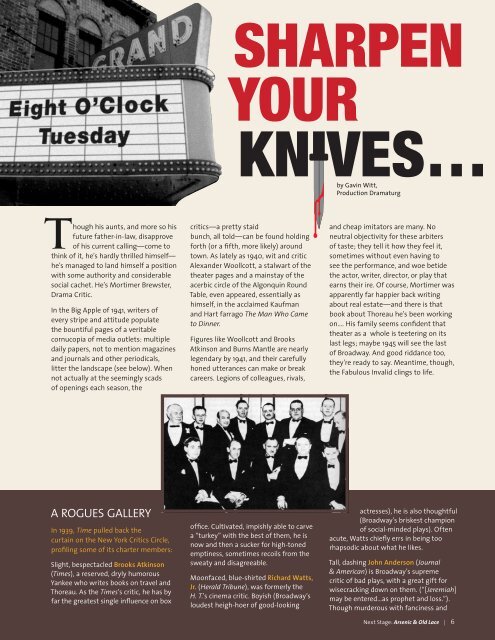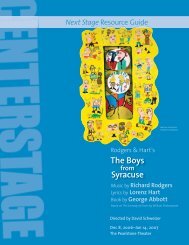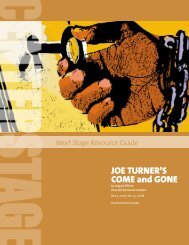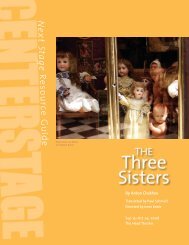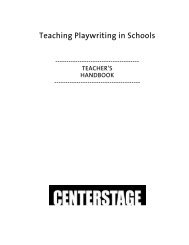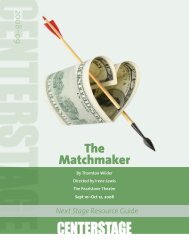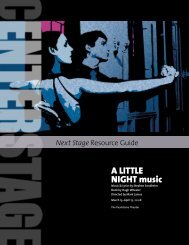Arsenic & Old lAce - Center Stage
Arsenic & Old lAce - Center Stage
Arsenic & Old lAce - Center Stage
You also want an ePaper? Increase the reach of your titles
YUMPU automatically turns print PDFs into web optimized ePapers that Google loves.
Sharpen<br />
Your<br />
by Gavin Witt,<br />
Production Dramaturg<br />
Though his aunts, and more so his<br />
future father-in-law, disapprove<br />
of his current calling—come to<br />
think of it, he’s hardly thrilled himself—<br />
he’s managed to land himself a position<br />
with some authority and considerable<br />
social cachet. He’s Mortimer Brewster,<br />
Drama Critic.<br />
In the Big Apple of 1941, writers of<br />
every stripe and attitude populate<br />
the bountiful pages of a veritable<br />
cornucopia of media outlets: multiple<br />
daily papers, not to mention magazines<br />
and journals and other periodicals,<br />
litter the landscape (see below). When<br />
not actually at the seemingly scads<br />
of openings each season, the<br />
critics—a pretty staid<br />
bunch, all told—can be found holding<br />
forth (or a fifth, more likely) around<br />
town. As lately as 1940, wit and critic<br />
Alexander Woollcott, a stalwart of the<br />
theater pages and a mainstay of the<br />
acerbic circle of the Algonquin Round<br />
Table, even appeared, essentially as<br />
himself, in the acclaimed Kaufman<br />
and Hart farrago The Man Who Came<br />
to Dinner.<br />
Figures like Woollcott and Brooks<br />
Atkinson and Burns Mantle are nearly<br />
legendary by 1941, and their carefully<br />
honed utterances can make or break<br />
careers. Legions of colleagues, rivals,<br />
and cheap imitators are many. No<br />
neutral objectivity for these arbiters<br />
of taste; they tell it how they feel it,<br />
sometimes without even having to<br />
see the performance, and woe betide<br />
the actor, writer, director, or play that<br />
earns their ire. Of course, Mortimer was<br />
apparently far happier back writing<br />
about real estate—and there is that<br />
book about Thoreau he’s been working<br />
on…. His family seems confident that<br />
theater as a whole is teetering on its<br />
last legs; maybe 1945 will see the last<br />
of Broadway. And good riddance too,<br />
they’re ready to say. Meantime, though,<br />
the Fabulous Invalid clings to life.<br />
A Rogues Gallery<br />
In 1939, Time pulled back the<br />
curtain on the New York Critics Circle,<br />
profiling some of its charter members:<br />
Slight, bespectacled Brooks Atkinson<br />
(Times), a reserved, dryly humorous<br />
Yankee who writes books on travel and<br />
Thoreau. As the Times’s critic, he has by<br />
far the greatest single influence on box<br />
office. Cultivated, impishly able to carve<br />
a “turkey” with the best of them, he is<br />
now and then a sucker for high-toned<br />
emptiness, sometimes recoils from the<br />
sweaty and disagreeable.<br />
Moonfaced, blue-shirted Richard Watts,<br />
Jr. (Herald Tribune), was formerly the<br />
H. T.’s cinema critic. Boyish (Broadway’s<br />
loudest heigh-hoer of good-looking<br />
actresses), he is also thoughtful<br />
(Broadway’s briskest champion<br />
of social-minded plays). Often<br />
acute, Watts chiefly errs in being too<br />
rhapsodic about what he likes.<br />
Tall, dashing John Anderson (Journal<br />
& American) is Broadway’s supreme<br />
critic of bad plays, with a great gift for<br />
wisecracking down on them. (“[Jeremiah]<br />
may be entered…as prophet and loss.”).<br />
Though murderous with fanciness and<br />
Next <strong>Stage</strong>: <strong>Arsenic</strong> & <strong>Old</strong> Lace |


